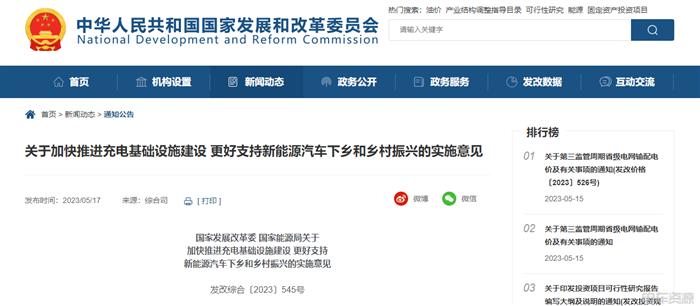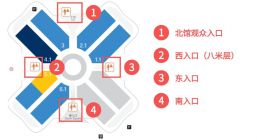Scan QRCode

Tram Resources learned that on May 17th, the National Development and Reform Commission and the National Energy Administration issued the "Implementation Opinions on Accelerating the Construction of Charging Infrastructure to Better Support the Rural Revitalization of New Energy Vehicles" (hereinafter referred to as the "Opinions"). The Opinion clearly states:
Strengthen the layout and construction of public charging infrastructure. Support local governments to carry out county and township public charging network planning based on actual conditions, and ensure the connection with national spatial planning, distribution network planning, etc., to accelerate the realization of "full coverage of county and county charging stations" and "full coverage of township and township charging stations" suitable for the use of new energy vehicles.
Promote new models such as intelligent and orderly charging. Encourage research on key technologies such as bidirectional interaction between electric vehicles and the power grid (V2G) and collaborative control of photovoltaic storage and charging, and explore the construction of charging infrastructure that integrates photovoltaic power generation, energy storage, and charging in rural areas with low utilization of charging stations. Implement peak and valley time of use electricity pricing policies and encourage users to charge during low periods.
Support the purchase and use of new energy vehicles in rural areas. Encourage new energy vehicle enterprises to optimize configuration through differentiated strategies based on the characteristics of rural consumers, and develop more economical and practical vehicle models, especially new energy cargo micro face, micro truck, light truck and other products. Establish a sound evaluation system for second-hand new energy vehicles, strengthen inspection and renovation of second-hand new energy vehicles, and encourage enterprises to provide high-quality second-hand new energy vehicles to the rural market.

The original text is as follows:
Implementation Opinions on Accelerating the Construction of Charging Infrastructure and Better Supporting the Rural Revitalization of New Energy Vehicles
Fa Gai Comprehensive [2023] No. 545
People's governments of various provinces, autonomous regions, and municipalities directly under the central government, Xinjiang Production and Construction Corps, State Grid Corporation of China Limited, and China Southern Power Grid Corporation Limited:
China has built the world's largest charging infrastructure system with the largest number, largest radiation area, and most comprehensive service vehicles, providing strong support for the rapid development of new energy vehicles. However, there are still problems in the vast rural areas, such as insufficient construction of public charging infrastructure, difficulty in installing and sharing charging facilities in residential communities, and prominent supply-demand conflicts during certain periods, which restrict the release of the consumption potential of new energy vehicles in rural areas. Moderately advancing the construction of charging infrastructure and optimizing the environment for purchasing and using new energy vehicles is of great significance for promoting new energy vehicles to rural areas, guiding green travel for rural residents, and promoting comprehensive rural revitalization. In order to do a good job in related work, with the consent of the State Council, the following implementation opinions are formulated.
1、 Innovate the operation and maintenance mode of charging infrastructure construction in rural areas
(1) Strengthen the layout and construction of public charging infrastructure. Support local governments to carry out county and township public charging network planning based on actual conditions, and ensure the connection with national spatial planning, distribution network planning, etc., to accelerate the realization of "full coverage of county and county charging stations" and "full coverage of township and township charging stations" suitable for the use of new energy vehicles. Reasonably promote the construction of centralized public charging stations, prioritize the allocation of public charging facilities in county-level and township enterprises and institutions, commercial buildings, transportation hubs (stations), service areas (stations) along highways, and extend them to relocation and centralized resettlement areas, key rural tourism villages, and other areas. In combination with the development of rural self driving tourism, accelerate the construction of charging stations along highways and eligible gas stations.
(2) Promote the construction and sharing of community charging infrastructure. Accelerate the construction of charging facilities in existing residential communities in rural areas, and carry out renovation of charging facilities according to local conditions. Residential communities with installation conditions can be equipped with a certain proportion of public charging parking spaces. Implement the requirements for the construction of charging infrastructure in newly built residential communities, promote the construction of fixed parking spaces for charging facilities or reserve installation conditions to meet the needs of direct meter installation and power connection. Implement the management responsibilities of grassroots management institutions such as street offices, increase guidance and supervision of residential community management units, and establish a "one-stop" coordination and complaint resolution mechanism. Residential community management units should actively assist users in installing charging facilities and explore mechanisms for cooperation with charging facility operators. Guide the community to promote sharing modes such as "nearby parking space sharing", "community time sharing", and "multiple cars and one pile".
(3) Increase support for the construction and operation of charging networks. Encourage places with conditions to introduce special support policies for the construction and operation of public charging infrastructure in rural areas. Utilize local government special bonds and other tools to support the construction of charging and swapping infrastructure such as eligible highways, ordinary national and provincial trunk road service areas (stations), public bus and trolley bus stations, and bus passenger stations. We will comprehensively consider the construction of rural charging networks and the development of transmission and distribution networks, increase support for land use, carry out supporting power grid construction and transformation, and enhance the support and guarantee capacity of rural power grids. By 2030, centralized charging and swapping facilities that implement a two-part electricity price system will be exempt from demand (capacity) electricity fees, and investment efficiency constraints related to power grid enterprises' distribution network construction will be relaxed, fully included in the recovery of transmission and distribution electricity prices.
(4) Promote new models such as intelligent and orderly charging. Improve the intelligence level of newly built charging infrastructure, incorporate intelligent and orderly charging into the functional scope of charging infrastructure and new energy vehicle products, encourage new energy vehicles to be equipped with charging piles with orderly charging functions, and accelerate the formation of industry unified standards. Encourage research on key technologies such as bidirectional interaction between electric vehicles and the power grid (V2G) and collaborative control of photovoltaic storage and charging, and explore the construction of charging infrastructure that integrates photovoltaic power generation, energy storage, and charging in rural areas with low utilization of charging stations. Implement peak and valley time of use electricity pricing policies and encourage users to charge during low periods.
(5) Improve the charging infrastructure operation and maintenance service experience. Based on the environment of charging facilities in rural areas, basic conditions of power grids, operation and maintenance requirements, carry out standard revision and typical design of charging facility construction. Improve the operation and maintenance system of charging facilities, improve facility availability and fault handling capabilities, and promote the interconnection of public charging and swapping network operators' platforms. Encourage parking lot and charging facility operation enterprises to innovate technology and management measures, guide fuel vehicles and new energy vehicles to park in zones, and maintain good charging order. Utilize technical means to conduct advance analysis and assessment of charging demand concentration periods and locations, and ensure service guarantees.
2、 Support the purchase and use of new energy vehicles in rural areas
(6) Enrich the supply of new energy vehicles. Encourage new energy vehicle enterprises to optimize configuration through differentiated strategies based on the characteristics of rural consumers, and develop more economical and practical vehicle models, especially new energy cargo micro face, micro truck, light truck and other products. Establish a sound evaluation system for second-hand new energy vehicles, strengthen inspection and renovation of second-hand new energy vehicles, and encourage enterprises to provide high-quality second-hand new energy vehicles to the rural market.
(7) Accelerate the promotion of public domain applications. Accelerate the promotion and application of new energy vehicles in county and township party and government organs, schools, hospitals, and other units, adjust measures to local conditions, increase the proportion of new energy vehicles used in official vehicles, and play a leading and demonstration role. Encourage areas with conditions to increase support for the application of new energy vehicles in areas such as public transportation, road passenger transportation, taxis, law enforcement, environmental sanitation, logistics and distribution.
(8) Provide diversified purchasing support policies. Where conditions permit, encourage rural residents with registered residence to purchase new energy vehicles in the county where registered residence is located, and provide support such as consumption vouchers. Encourage relevant automobile companies and places with conditions to provide incentives for replacing low-speed electric vehicles with new energy vehicles. Encourage local governments to strengthen government enterprise linkage and carry out activities such as giving charging coupons for car purchases. Increase support for automobile consumption credit in rural areas, and encourage financial institutions to reasonably determine the down payment ratio, loan interest rate, and repayment period under the premise of legal compliance and controllable risks.
3、 Strengthen the management of new energy vehicle promotion services in rural areas
(9) Increase publicity and guidance efforts. Actively promote through news reports, expert comments, internet new media, and other means, support local governments and industry institutions to organize new energy vehicle manufacturers to carry out brand exhibitions, test drives, and other activities, encourage new energy vehicle enterprises to collaborate with upstream battery enterprises in the industry chain to carry out free "battery health checks" activities for rural car purchases within three years, and enhance consumers' acceptance of new energy vehicles.
(10) Strengthen sales service network. Encourage new energy vehicle enterprises to sink their sales networks, guide them and third-party service enterprises to accelerate the construction of joint business outlets, establish supporting after-sales service systems, regularly carry out maintenance and after-sales service activities in rural areas, provide emergency rescue and other services, and alleviate purchasing and usage concerns. Encourage vocational colleges to cultivate new energy vehicle maintenance technicians in rural areas, provide vocational education related to vehicle maintenance, charging station maintenance, etc., and promote the effective connection between local employment and support for new energy vehicle consumption.
(11) Strengthen safety supervision. Improve the safety supervision system for new energy vehicles, utilize various means according to local conditions, improve the quality and safety level of new energy vehicles and batteries, strictly manage charging facilities in rural areas, guide charging facility operators to connect to government charging facility supervision platforms, strictly match the safety conditions of power supply and centralized charging places, ensure compliance with relevant laws and regulations, national standards or industry standards, and strengthen safety business training for management personnel, Regularly investigate potential hazards of existing charging stations. Guide rural residents to install and use independent charging stations, and reasonably equip leakage protectors and grounding equipment to improve the level of electricity safety.
Each region and relevant department should effectively strengthen organizational leadership, clarify the division of responsibilities, take proactive actions, promote the implementation and effectiveness of relevant policy measures as soon as possible, improve purchase and use policies, further improve the charging infrastructure network, ensure "built, managed, and sustainable", create a good environment for the promotion and use of new energy vehicles in rural areas, and better meet the production and living needs of the people.
National Development and Reform Commission
National Energy Administration
May 14, 2023
AMS2024 Exhibition Guide | Comprehensive Exhibition Guide, Don't Miss the Exciting Events Online and Offline
Notice on Holding the Rui'an Promotion Conference for the 2025 China (Rui'an) International Automobile and Motorcycle Parts Exhibition
On September 5th, we invite you to join us at the Wenzhou Auto Parts Exhibition on a journey to trace the origin of the Auto Parts City, as per the invitation from the purchaser!
Hot Booking | AAPEX 2024- Professional Exhibition Channel for Entering the North American Auto Parts Market
The wind is just right, Qianchuan Hui! Looking forward to working with you at the 2024 Wenzhou Auto Parts Exhibition and composing a new chapter!
Live up to Shaohua | Wenzhou Auto Parts Exhibition, these wonderful moments are worth remembering!
Free support line!
Email Support!
Working Days/Hours!





